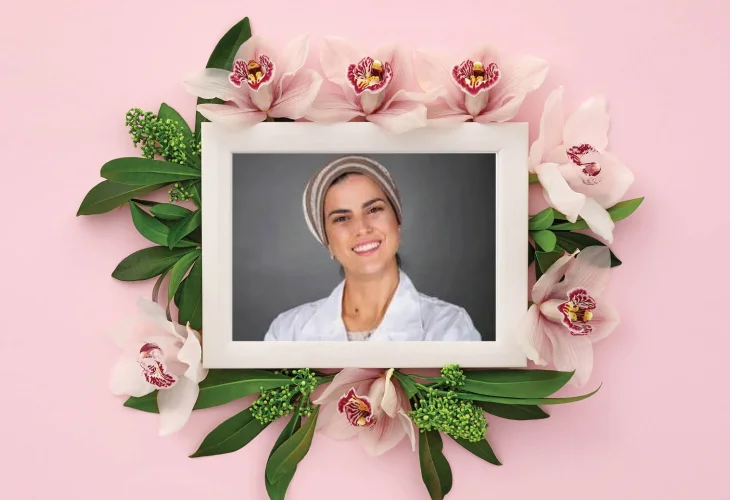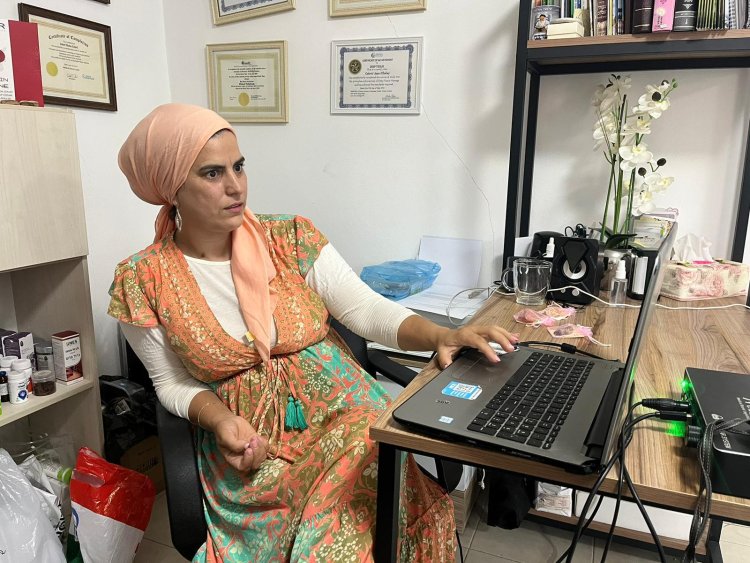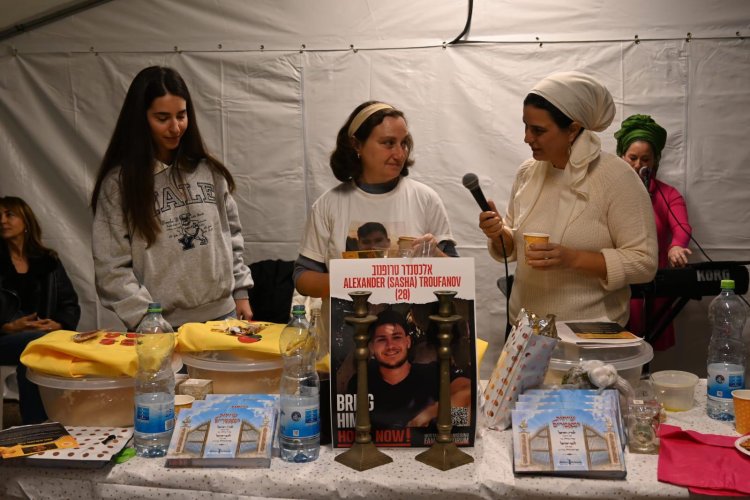From a Brazilian Prison to Embracing Hostage Families: Oshrit Elisha's Journey
While in Brazil's most secure prison, Oshrit Elisha never imagined how that experience would later drive her to support families of hostages. Here’s her riveting and inspiring story.

In recent weeks, Oshrit Elisha has been frequently seen in the Hostages' Square. Though not related to any of them, she is called upon to encourage and support, especially by organizing challah-baking events. These often occur on a hostage’s birthday or after the release of a video showing proof of life, when families wish to express gratitude and perform mitzvot and good deeds.
Oshrit's connection to the hostages, however, is deeper than it might appear. She understands the feelings of those held captive, knowing firsthand the pain of separation from family, and the fear of impending death in its most literal sense.
"For four years, I was an inmate in Brazil's most high-security prison," she shares. "Of course, it’s incomparable to what the hostages in Gaza experience, for many reasons. But the similarities can’t be ignored. I empathize with the families deeply, knowing how desperately they cling to any glimmer of hope that their loved ones will return to their previous lives."

A Childhood of Challenges
Oshrit's story begins over 30 years ago, growing up in a family she describes as "traditional plus." "My father regularly attended synagogue on Shabbat, but when he returned, we all watched TV and went to soccer games. We kept a kosher home, and my mother wanted us to dress modestly, but the boundaries were blurred and quite confusing."
At ten, Oshrit was harmed by a religious man, leading to troubling questions. "As a young girl, I thought if this was how a religious person behaves, then, heaven forbid, so must be the way of Hashem, and it meant all religious people were like that. From that moment, I detested religion and those who practiced it," she reveals. "Additionally, I physically struggled and experienced symptoms of anorexia, as I just stopped eating.
"By the end of sixth grade, I switched schools and met girls who taught me I could eat and then purge. This seemed a perfect solution, leading to my experience with symptoms of bulimia, including severe binges and purges. At 16, I began feeling very unwell, even losing balance and falling in public. After several such incidents, including one leading to hospital admission, my parents recognized the severity and sought treatment for me."
Oshrit pauses to note her parents were wonderful, dedicated to her throughout. "Thanks to them, I received hospital treatment and then went to the Retorno rehab center, which was just starting at the time. I was there three months, stabilized, but returning to school proved too drastic. I relapsed, experiencing regressive symptoms and nutrition problems. After running away from school, I moved to Tel Aviv living a life that was far from ideal.

"A Daughter of Hashem"
During this tumultuous time, Oshrit received a tempting offer: a trip to Brazil requiring her to transport a bag of illicit materials back to Israel. "The full story wasn't clear from the start," she clarifies, "but the allure of travel and money was compelling. Thus I found myself on a plane, enjoying time with Israeli friends, and successfully completing the task assigned to me, basking in the false belief I had acquired it all without much effort."
Yet, on her return home, the unforeseen occurred. Airport police identified her and found the prohibited materials in her bag. It was irreversible, landing her in one of Brazil’s most secure prisons, the hardest place she could fathom.
Oshrit spent four years in prison, enduring the most harrowing experiences and facing life-threatening situations. "In my first week, there was an inmate revolt," she recalls. "Without understanding a word of Portuguese, I was bewildered by the chaos, eventually subdued by armed officers restoring order. Almost miraculously, a fellow inmate ushered me to hide under a bed. The only possession I had was a small paper with three chapters of Psalms my mom gave me. Suddenly, I found myself reciting them repeatedly, recalling family moments like mom and me reciting the Shema, saying it incessantly amid tears and tremors at the thought these could be my last moments.
"Unexpectedly, I felt an odd sensation as if enveloped in an embrace. When officers entered the room, a fellow inmate explained I was Israeli and didn’t speak the language; they simply walked away.
"The other inmates gathered around, kissing my hands and embracing me, saying, 'It’s all thanks to you.' One explained that in her 11 years, no revolt ended without harm. Repeatedly, she told me, 'You’re a daughter of Hashem,' a nickname that stuck among the inmates."

Never Stop Believing
Oshrit shares another moving prison story: "It was nearing Rosh Hashanah when I learned I owed a cellmate $100. Desperate, as she brandished a knife near my throat, I offered my cell phone, but she insisted on money.
"I tearfully called home, but my parents couldn't assist, and the local community offered similar replies. Scared of a humiliating death, drowning in fears, I opened my Psalms book, pleading to Hashem for salvation.
"Reading Psalm 91: 'He who dwells in the shelter of the Most High...' triggered my cell phone to ring. It was an old elementary school friend’s mother, in Brazil on a mission, asking if I needed anything for the holiday. I was speechless, inundated with emotion. 'I need $100,' I said. Shocked, she asked if that was all, suggesting visits and gifts. 'That's all I need.' From the street, she transferred the money within minutes, giving me a new shot at life. I hope she realizes she was Hashem’s messenger, saving me from death."
Oshrit's prison days remained perilous, where thoughts of never leaving that place were frequent. "However, amidst the horror, I also experienced great upliftment and closeness to the Divine," she recalls. "The Jewish community of Sao Paulo constantly supported me, enabling observance of holidays through various messengers providing holiday essentials, guiding me through significant spiritual growth."
Do you remember your release day?
"Certainly, though it wasn’t the joyous occasion you'd expect. I didn't return to my former life, troubled by severe psychological scars. Fear paralyzed me, struggling to meet people. The Jewish community and my lawyer helped transition me back gradually, attending events and re-acclimating to life outside.
"Back in Israel, I lived with my parents but fell into depression. Writing became my outlet, documenting every experience in a diary. I embarked on inner work, focusing on positive thinking, crafting a self-healing plan. Slowly, I gained stability, embracing my Jewish roots, returning to a joyful, healthy existence."
Today, Oshrit is married, a mother of four, and works in cosmetology, naturopathy, and natural pharmacology. She counsels and supports girls and families, particularly those of hostages. "I feel a profound mission to help and encourage everyone I can," she says.
Isn't revisiting those challenges difficult after overcoming them?
"It’s more challenging than you'd imagine, but that’s precisely my mission. I meet girls, hear the toughest stories, but am not deterred. I firmly believe anyone can overcome any situation, and that’s my constant message – we mustn't despair, hope always exists, and even in direst times, redemption can sprout."

